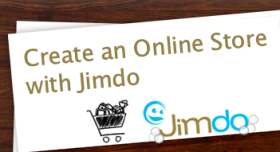 People who use Jimdo to create and publish their own basic website know how versatile yet easy-to-use the tool really is – I know because I used the service myself to set up and manage a site for my wedding last year. And if these users now want to start selling something online through their websites, it wouldn’t involve as much hassle as it would have a week ago.
People who use Jimdo to create and publish their own basic website know how versatile yet easy-to-use the tool really is – I know because I used the service myself to set up and manage a site for my wedding last year. And if these users now want to start selling something online through their websites, it wouldn’t involve as much hassle as it would have a week ago.
This is because the German startup behind Jimdo has added a ‘Store’ feature to their website building service, enabling users to add a full-fledged ecommerce element to their sites.
Jimdo users who want to set up an online business can use Store to start organizing and publishing a catalog of products, which can be presented in various ways: multiple pictures with detailed-view zoom functionality, videos, text, PDFs and more. Products can have multiple variations (e.g. shirt colors, sizes, etc.) and can be featured as ‘bestsellers’ or within a given specific product category.
A shopping cart feature is built right into the new product extension, complete with PayPal integration and the ability to include a custom check-out process (i.e. by invoice). The startup has also considered the challenges of conducting online business on a global level, making it possible for sellers to switch between U.S. Sales Tax and VAT (Europe) and customize shipping costs accordingly.
Here’s a reference site, fully powered by Jimdo (more can be found here). For pricing and current promotions, check this page.
In other, rather unexpected news, Jimdo investor United Internet has withdrawn from the company’s board. In May 2009, the international ISP had acquired 30% of the startup and also inked a license deal with the young company that allowed it to have its hosting provider subsidiary 1&1 enable their customers to build Jimdo sites as a white-labeled service.
Jimdo co-founder Matthias Henze had this to say about the whole ordeal:
“United Internet has left the board of shareholders. As you know, they mainly invested because of the partnership we had with 1&1. Since 1&1 had different views concerning the roadmap we changed the agreement with 1&1 which now has a license to develop the white-labeled version on its own. I’m really sorry, but due to signed NDAs I can’t share any more details on the deal.”
It’s a bit of a strange development, but Jimdo doesn’t seem to be all too worried about the ties getting cut – the company also tells me they’ve reached profitability with team of 30 full-time employees. We’ll see how they fare now that they’re on their own again.